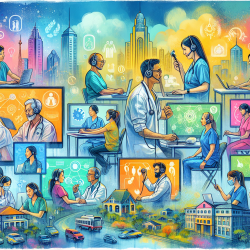Introduction
In the field of speech-language pathology, practitioners are continuously seeking ways to improve outcomes for children. One innovative approach is to draw insights from seemingly unrelated fields, such as global health research. The research article titled "The Ebola Outbreak of 2014-2015: From Coordinated Multilateral Action to Effective Disease Containment, Vaccine Development, and Beyond" provides valuable lessons that can be applied to enhance speech-language pathology practices.
Data-Driven Decisions: A Key Takeaway
The Ebola outbreak research underscores the importance of data-driven decisions in managing complex situations. For speech-language pathologists, adopting a similar approach can lead to more effective therapy outcomes. By systematically collecting and analyzing data on each child's progress, practitioners can tailor interventions to meet individual needs more precisely.
Utilizing Modern Information Technology
The research highlights the use of modern information technology in tracking the spread of Ebola. Similarly, speech-language pathologists can leverage technology to monitor and assess children's progress in real-time. Tools such as digital assessments and online therapy platforms, like those provided by TinyEYE, can facilitate more accurate and timely interventions.
Coordinated Efforts for Better Outcomes
The success of the global response to Ebola was due in part to coordinated multilateral efforts. In speech-language pathology, collaboration among therapists, educators, and families is crucial for creating a supportive environment for children. By fostering strong communication and teamwork, practitioners can ensure that all stakeholders are aligned in their goals for the child's development.
Encouraging Further Research
Just as the Ebola research led to advancements in vaccine development, speech-language pathologists are encouraged to engage in continuous research and professional development. Staying informed about the latest evidence-based practices and emerging technologies can enhance the quality of care provided to children.
Conclusion
The insights gained from the Ebola outbreak research offer valuable lessons for speech-language pathologists. By embracing data-driven decisions, utilizing technology, and fostering coordinated efforts, practitioners can improve outcomes for children. To delve deeper into the original research paper, please follow this link: The Ebola Outbreak of 2014-2015: From Coordinated Multilateral Action to Effective Disease Containment, Vaccine Development, and Beyond.










